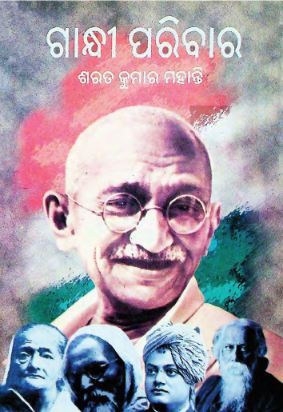In the vast realm of Odia literature, Sarat Kumar Mohanty’s “Gandhi Paribar,” published in 2008, is an outstanding and notable work that provides an in-depth exploration of the Mahatma Gandhi family. Through this essay collection, the author delves deep into the lives of Mohandas Karamchand Gandhi, his wife Kasturba Gandhi, and the ardent follower Vinoba Bhave. Each sub-essay offers a unique glimpse into their personalities, ideologies, and their relentless pursuit of social reform and independence for India.
The sub-essay dedicated to Mahatma Gandhi vividly encapsulates his life’s journey, philosophies, and contributions to India’s freedom movement. Sarat Kumar Mohanty meticulously portrays the transformative phases of Gandhi’s life—from the formative years in Porbandar and his legal battles in South Africa to his pivotal role in India’s non-violent struggle against British colonialism. The narrative is steeped with rich anecdotes that illuminate Gandhi’s commitment to truth (Satyagraha) and non-violence (Ahimsa).
Mohanty’s depiction does not just glorify Gandhi, but presents him as a multi-dimensional character fraught with internal dilemmas and societal challenges. Through his writing, readers are offered an authentic portrayal of Gandhi’s trials, triumphs, and his unyielding spirit. Mohanty’s eloquent prose ensures that Gandhi’s life and teachings remain deeply engraved in the reader’s mind, inspiring generations to come.
The essay on Kasturba Gandhi offers an intimate look at the life of the woman who stood beside the Mahatma through thick and thin. Sarat Kumar Mohanty sheds light on Kasturba’s strength, resilience, and her pivotal role in Gandhi’s endeavors. Often overshadowed by her husband’s towering persona, Kasturba’s contributions are no less significant. She was a steadfast pillar of support and an unsung hero who played a crucial role in mobilizing women and addressing social issues such as untouchability and women’s rights.
Mohanty portrays Kasturba as not merely Gandhi’s spouse but as a leader in her right, who managed to maintain her unique identity while supporting her husband’s vision. The narrative underscores her sacrifices, fortitude, and the personal trials she endured while balancing her familial responsibilities and activism. Through this essay, Mohanty ensures that Kasturba’s legacy is celebrated and recognized for its true worth.
The sub-essay on Vinoba Bhave examines the life and philosophy of one of Gandhi’s most dedicated disciples. Vinoba, a visionary thinker and spiritual leader, is best known for his efforts in the Bhoodan Movement, which aimed at redistributing land to the landless. Mohanty’s writing brings to light Vinoba’s unwavering dedication to Gandhi’s principles and his relentless pursuit of social equity.
Sarat Kumar Mohanty vividly captures Vinoba’s intellectual prowess, deep moral convictions, and his simplistic lifestyle. The author’s insightful analysis reveals how Vinoba’s initiatives extended beyond mere land redistribution to encompass broader social reforms that echoed Gandhi’s vision of an egalitarian society. Through this portrayal, Vinoba emerges as a significant torchbearer of Gandhi’s ideologies, whose life serves as a testament to selfless service and humility.
Gandhi Paribar by Sarat Kumar Mohanty is more than just an essay book; it is a poignant tribute to the individuals who played pivotal roles in shaping India’s destiny. Through his engaging narrative and insightful analysis, Mohanty brings these historical figures to life, allowing readers to connect with their human aspects and their immense contributions. The book is essential reading for anyone interested in understanding the intricate dynamics and the indomitable spirit of the Gandhi family, and it continues to be a significant work in Odia literature.
Books Info
| Books name | Gandhi Paribar/ଗାନ୍ଧୀ ପରିବାର |
| Author | Sarat Kumar Mohanty |
| No Of pages | 194 |
| Publisher | Agrasduta |
| Publication | 2008 |
| Printed At | Panhasakha Offset |
| Distributor | NA |

